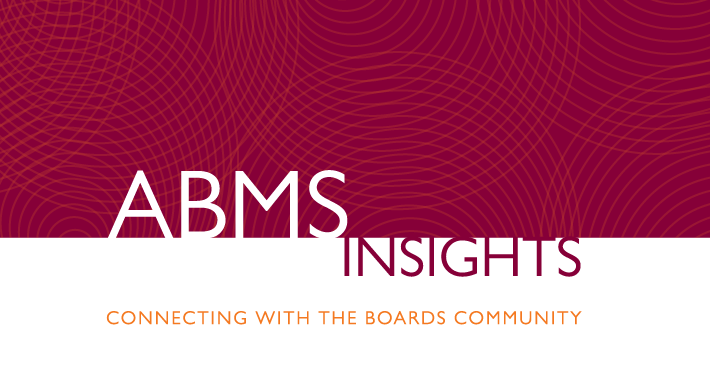
A lot has happened in longitudinal assessment at the American Board of Medical Specialties (ABMS) and its Member Boards in the New Year. After extensive pilot testing, some ABMS Member Boards have transitioned from their traditional exams to longitudinal assessment options while others have introduced innovative formative assessment pilots.

Longitudinal assessment approaches are designed to support continuing professional development as part of the Member Boards’ continuing certification programs. Drawing on the principles of adult learning combined with modern technology to promote learning, retention, and transfer of information, these approaches involve administering shorter assessments of specific content, such as medical knowledge, repeatedly over a period of time. Through a recurring examination process, concepts and information are reinforced so that knowledge is retained and accumulated gradually. Knowledge gained in this fashion can be more readily retrieved and applied to various situations. Overall, these programs allow physicians to assess their knowledge, fill knowledge gaps, and demonstrate their proficiency. They may offer both time and cost savings to physicians certified by these Boards by reducing or eliminating the need for study courses, travel to exam centers, and time away from practice.
Member Boards have been exploring longitudinal assessment approaches for the past few years. The American Board of Anesthesiology (ABA) was the first to launch a pilot with 700 board certified anesthesiologists using a prototype for its MOCA Minute®, the longitudinal assessment that is the core of its Maintenance of Certification in Anesthesiology™ (MOCA®) program, in 2014. After ABA pilot tested the web-based tool with additional anesthesiologists and evaluated it for its rigor and physician feedback, ABMS approved ABA’s request to transition MOCA Minute from a pilot to a permanent MOCA program component in April 2018. Similar steps have been followed by many Boards that have subsequently piloted and/or implemented innovative assessment approaches. Come January 2019, the following Boards significantly advanced their MOC programs:
- The American Board of Obstetrics and Gynecology made its MOC pilot a permanent option for board certified obstetricians-gynecologists. Now referred to as the Performance Pathway, it allows for those who meet a certain threshold of performance on the Lifelong Learning and Self-Assessment component of MOC to receive credit for the Board’s MOC exam. Diplomates must meet all other MOC criteria to be eligible to participate in the Performance Pathway (including all Professionalism and Professional Standing requirements).
- The American Board of Pediatrics (ABP) transitioned its MOC program, known as MOCA-Peds, from pilot to an official assessment option. MOCA-Peds is now an alternative to the proctored MOC exam for pediatricians in general pediatrics, child abuse pediatrics, pediatric gastroenterology, and pediatric infectious diseases whose MOC cycle began in 2019. ABP will make four additional pediatric subspecialties available each year until 2022, at which point 15 pediatric subspecialties will be offered as a longitudinal assessment option for continuing certification.
- The American Board of Ophthalmology replaced its DOCK Examination with the Quarterly Questions Program, which enables certified ophthalmologists to earn MOC and continuing medical education credit.
- The American Board of Radiology (ABR) rolled out its new Online Longitudinal Assessment for all radiologists certified in diagnostic radiology. ABR plans to implement the program, which replaces the Board’s MOC exam, in January 2020 for those certified in radiation oncology, medical physics, and interventional radiology.
- The American Board of Family Medicine (ABFM) launched a pilot for a longitudinal assessment option that is based on its popular Continuous Knowledge Self-Assessment platform. Family physicians current with continuous certification and are due to take the exam in 2019 are eligible to participate in the pilot, which is an option in place of ABFM’s 10-year secure exam. More than 6,000 family physicians are participating in the first year of the pilot.
- The American Board of Orthopaedic Surgery (ABOS) started piloting the ABOS Web-Based Longitudinal Assessment, known as ABOS WLA, for board certified orthopaedic surgeons who may choose this new knowledge assessment pathway instead of the Board’s Practice-Profiled Computer or Oral Recertification Examinations.
- The American Board of Psychiatry and Neurology (ABPN) launched a pilot for a professional journal article-based assessment activity designed as an optional alternative to its MOC exam. The Pilot Project will run for three years and, if approved by ABMS, ABPN plans to transition diplomates into this program in 2022 as a permanent alternative to its secure MOC exam.
- The seven Boards participating in CertLink® invited more than 1,000 new board certified physicians to join their pilots in the first quarter of 2019, bringing the total to nearly 8,500 participants. They have answered 375,000-plus questions across the CertLink Boards.
All of these innovations are part of ABMS’ and its Member Boards’ overall commitment to bring value to physicians in practice with programs that support their learning and improvement needs. They also are in sync with the recommendations made by the Continuing Board Certification: Vision for the Future Commission in its final report. Presented to the ABMS Board of Directors in February, the report calls for the incorporation of longitudinal and other innovative informative assessment strategies that support learning, identify knowledge and skill gaps, and help board certified physicians stay current. The Boards will continue to focus on improving their programs in 2019 and beyond.
Read the Latest Issue of the ABMS Insights Newsletter
-
Read More:
- ABMS Insights |
- Member Boards |
